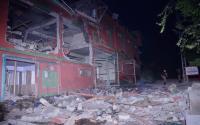Common Dreams / Published on Friday, August 8, 2003 by the New York Times
Since we're stuck in Iraq indefinitely, we may as well try to learn something. But I suspect that our current leaders won't be receptive to the most important lesson of the land where cities and writing were invented: that manmade environmental damage can destroy a civilization.
When archaeologists excavated the cities of ancient Mesopotamia, they were amazed not just by what they found but by where they found it: in the middle of an unpopulated desert. In "Ur of the Chaldees," Leonard Woolley asked: "Why, if Ur was an empire's capital, if Sumer was once a vast granary, has the population dwindled to nothing, the very soil lost its virtue?"
The answer — the reason "the very soil lost its virtue" — is that heavy irrigation in a hot, dry climate leads to a gradual accumulation of salt in the soil. Rising salinity first forced the Sumerians to switch from wheat to barley, which can tolerate more salt; by about 1800 B.C. even barley could no longer be grown in southern Iraq, and Sumerian civilization collapsed. Later "salinity crises" took place further north. In the 19th century, when Europeans began to visit Iraq, it probably had a population less than a tenth the size of the one in the age of Gilgamesh.
Modern civilization's impact on the environment is, of course, far greater than anything the ancients could manage. We can do more damage in a decade than our ancestors could inflict in centuries. Salinization remains a big problem in today's world, but it is overshadowed by even more serious environmental threats. Moreover, in the past environmental crises were local: agriculture might collapse in Sumer, but in Egypt, where the annual flooding of the Nile replenished the soil, civilization went on. Today, problems like the thinning of the ozone layer and the accumulation of greenhouse gases affect the planet as a whole.
On the other hand, today we have the ability to understand environmental threats, and act to contain them. The Montreal Protocol, signed in 1989, shows how science and policy can work hand in hand. Research showed that certain chemicals were destroying the ozone layer, which protects us from ultraviolet radiation, so governments agreed to ban the use of those chemicals, and the ban appears to be succeeding.
But would the people now running America have agreed to that protocol? Probably not. In fact, the Bush administration is trying to reinterpret the agreement to avoid phasing out the pesticide methyl bromide. And on other environmental issues — above all, global warming — America's ruling party is pursuing a strategy of denial and deception.
Before last year's elections Frank Luntz, the Republican pollster, wrote a remarkable memo about how to neutralize public perceptions that the party was anti-environmental. Here's what it said about global warming: "The scientific debate is closing [against us] but is not yet closed. There is still an opportunity to challenge the science." And it advised Republicans to play up the appearance of scientific uncertainty.
But as a recent article in Salon reminds us, this appearance of uncertainty is "manufactured." Very few independent experts now dispute that manmade global warming is happening, and represents a serious threat. Almost all the skeptics are directly or indirectly on the payroll of the oil, coal and auto industries. And before you accuse me of a conspiracy theory, listen to what the other side says. Here's Senator James Inhofe of Oklahoma: "Could it be that manmade global warming is the greatest hoax ever perpetrated on the American people? It sure sounds like it."
The point is that when it comes to evidence of danger from emissions — as opposed to, say, Iraqi nukes — the people now running our country won't take yes for an answer.
Meanwhile, news reports say, President Bush will spend much of this month buffing his environmental image. No doubt he'll repeatedly be photographed amid scenes of great natural beauty, uttering stirring words about his commitment to conservation. His handlers hope that the images will protect him from awkward questions about his actual polluter-friendly policies and, most important, his refusal to face up to politically inconvenient environmental dangers.
So here's the question: will we avoid the fate of past civilizations that destroyed their environments, and hence themselves? And the answer is: not if Mr. Bush can help it.






